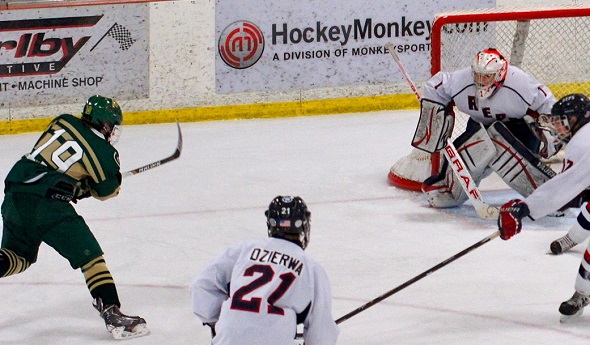
'Miracle' Comeback, Memorable Finish
February 27, 2014
By Geoff Kimmerly
Second Half editor
At some point, Jay Jones is sure, he and his friends from Traverse City West will reminisce about playing in the second-longest hockey game in MHSAA history.
Erik Anton always will remember sending the shot into the top corner of the net that made the score 2-1 in favor of his team and ended the seven-overtime marathon against Jones and the Traverse City Bay Reps – but there’s no way Anton will be the one bringing it up.
No need. His goal as midnight approached Monday immediately became legendary in the Traverse City area – complete with a captivating back story as well.
Anton’s shot ended the game after 103 minutes and 33 seconds – or 4:33 into the seventh overtime.
A little more than year ago, Anton couldn’t skate, or for that matter walk – he was hospitalized in Grand Rapids, paralyzed from the rib cage down because of a viral infection.
And among his visitors was Jones, a friend since childhood and the Bay Reps goalie Monday who stopped 48 shots before Anton potted the game winner.
“I don’t think it’s something where I’ll be like, ‘Remember that?’ But obviously it will be in our memories,” Anton said. “We were trying for such a long time. (For them) it was such a heart-breaking experience.
“(But) I might tease him about it a little bit.”
Anton and Traverse City West live on, having also beaten Manistee on Wednesday to advance to Saturday’s Division 1 Regional Final against Grand Rapids West Catholic. A trophy-earning win that night surely would add to an incredibly memorable week.
But it already has been an unforgettable year for the Titans junior wing, even as his most “miraculous” feat came against a friend who has been among those rooting him on these last many months.
Suddenly sidelined
Anton has played hockey since he was 3, and he has six goals and eight assists this winter. It’s his number one sport – although he also plays tennis and lacrosse.
Needless to say, he’s always been an active guy.
 Until December 2012. Anton contracted transverse myelitis, an infection affecting the spiral cord caused in this case by a virus. His immune system, mistaking that part of his nervous system for the virus, attacked – causing the paralysis that sent him on a trip to Helen DeVos Children’s Hospital in Grand Rapids.
Until December 2012. Anton contracted transverse myelitis, an infection affecting the spiral cord caused in this case by a virus. His immune system, mistaking that part of his nervous system for the virus, attacked – causing the paralysis that sent him on a trip to Helen DeVos Children’s Hospital in Grand Rapids.
“How I describe it, I was lying down and somebody just put 1,000 pounds on top of my legs,” Anton said. “You try to move your legs and you can’t.
“(The doctor) would take a pen and touch the bottom of my foot, and it felt like they were taking a lighter to the bottom of my foot.”
His doctor gave him a 33 percent chance of recovering fully. Anton was expected to stay in Grand Rapids at the Mary Free Bed rehabilitation hospital for three months.
That first weekend away from home, Anton was visited by teammates and friends, including Jones. Their travel teams growing up had included about half of the current West team, a few who now play at Traverse City Central and a handful more now on the Bay Reps.
“I was shocked to see him like that,” Jones said, “not being able to move a whole lot.”
Friendly support
Jones, a sophomore, attends St. Francis High School. The Bay Reps are a hockey co-op team comprised of students from seven schools. He and Anton never went to the same one, but their families are friends and they became hockey teammates on the travel circuit when they were 8 or 9.
They also started lacrosse together, played tennis together, golfed and more recently snowboarded together.
 Jones first heard of what had befallen his friend in the lockerroom after a practice. Stunned to say the least, Jones didn’t say much for the first day or two before he and their friends made the trip to Grand Rapids.
Jones first heard of what had befallen his friend in the lockerroom after a practice. Stunned to say the least, Jones didn’t say much for the first day or two before he and their friends made the trip to Grand Rapids.
By Jones’ description, Anton is a funny guy, definitely an extrovert. They together were the talkers on their travel teams growing up. Jones found his friend wasn’t much different in this unusual setting, just a little quieter. “He actually got up and we wheeled him around the hospital area,” Jones said. “We were laughing and making jokes like normal.”
“I just remember being in high spirits,” Anton added. “I always love seeing my friends, and having my friends come down and visit me, just being able to be with them again, especially when I was just laying in the hospital ...”
Anton said he knew from the start that he wouldn’t settle for a three-month hospital stay and surely not for paralysis for life if he could help it. He showed enough improvement to go home after just two weeks. And by the end of the spring lacrosse season, he felt back at full strength.
“It is pretty amazing. Once he got back, everyone pretty much treated him like normal,” Jones said. “He was back to his old self.”
Memorable moment
Anton could feel Jones’ stick jabbing at his skates whenever he came close to the net Monday. Anton laughed to himself at the little unspoken competition between the two.
He felt strong going into the third overtime, but by the fourth his legs were feeling heavy. By the seventh overtime his shifts had shortened substantially as players dug for any energy they could muster.
 Meanwhile, Jones would smack his stick at the goal posts between periods, swing it at the net – “pretty much trying to stay awake at that point,” he said.
Meanwhile, Jones would smack his stick at the goal posts between periods, swing it at the net – “pretty much trying to stay awake at that point,” he said.
As the overtimes piled up, Jones also began to consider the significance of being part of such a game. It would be talked about for a long time. Everyone would know it was hard-fought. Win or lose, both teams would feel a sense of accomplishment. But if his team lost, he’d be absolutely crushed.
Both he and Anton saw a similar build-up to Anton’s deciding shot. Anton had been on the ice for about 15 seconds. His team was regrouping in the neutral zone when teammate Caleb Breithaupt ended up with a loose puck and pushed it ahead to forward Nick Schultz at the blue line.
Anton took a pass at the top of a circle in front of the Bay Reps’ net. Jones saw him line up the shot. A defenseman skated between them, but remained just off to a side. Anton fired at the high left corner of the net. Jones never saw the puck go by.
It was the Bay Reps’ fifth overtime loss this season. Jones took a knee staring at the ice in front of him. His teammates skated over and provided some support, but the moment was “surreal” – for a moment, Jones said, the ice was completely silent. And then he looked into the corner and saw number 19, Anton, celebrating. He smiled, just a little.
Traverse City West had lost to the Reps in overtime, 5-4, in a 2013 Pre-Regional opener, and then again earlier this season. Those details provide additional layers to an extraordinary experience players on both sides will tell about in the years to come.
It’s what Anton has learned to relish while recovering from his unfortunate circumstance, even if he’ll let others start this conversation the next time he’s hanging with Jones and his other Bay Reps pals.
“I definitely don’t take anything for granted anymore. I always put all my effort into sports, but after going through that, I really try to enjoy it, make the most of it when I can,” Anton said. “I always had a competitive edge, and I still do. Now I definitely try to enjoy it while I’m out there, enjoy the experience.”
Click to read more about Anton’s initial recovery from the Traverse City Record-Eagle.
PHOTOS: (Top) Traverse City West’s Erik Anton (19) unloads a shot at Bay Reps goalie Jay Jones that Jones stops Monday. (Middle top) Anton, seated, is visited by friends including Jones (gray jacket) during his hospital stay. (Middle below) Anton, left, and Jones take a brief moment from lacrosse during their younger days. (Below) Members of the West and Bay Reps hockey teams hold up Anton’s jersey after a game he could not play in last season. (Photos courtesy of Madelaine Jones.)
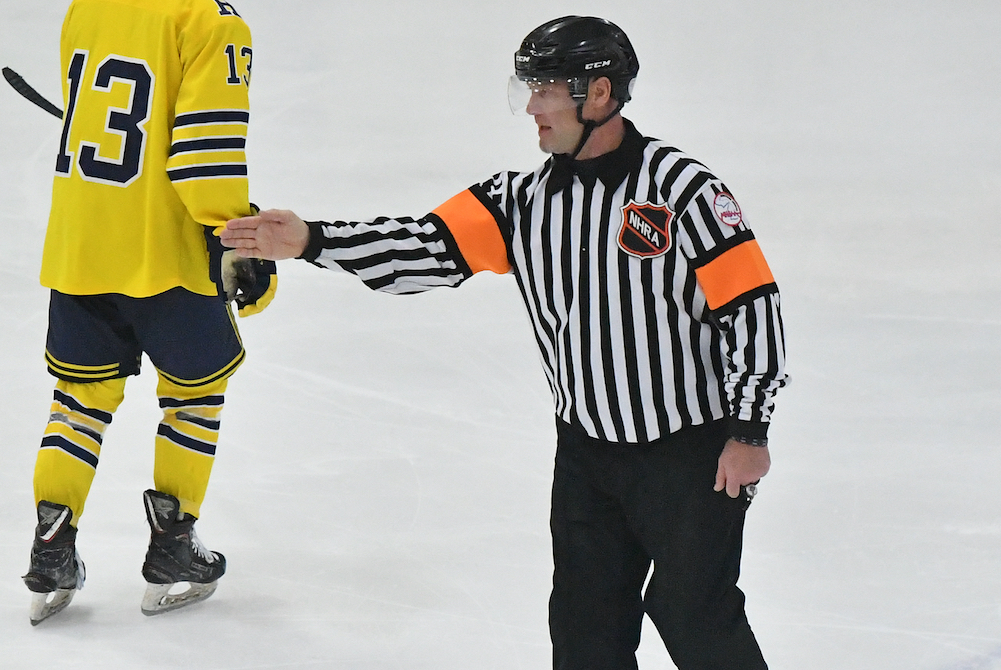
Retired NHL-er Back on Ice to Answer Call - By Making Them
By
Rob Kaminski
MHSAA benchmarks editor
March 16, 2023
The most accomplished skater on the ice during Friday’s triple-overtime MHSAA Division 1 Semifinal hockey thriller between Hartland and Brighton was not wearing the school colors of either team.
In front of a packed house at Plymouth’s USA Hockey Arena, referee Bryan Smolinski was in stripes, just like the rest of his officiating crew.
In his former life, he pulled on plenty of sweaters before lacing up the skates. That happens when one logs more than 1,000 games, tallies nearly 300 goals (274) and close to 400 assists (377) with eight teams spanning a 15-year playing career in the National Hockey League.
So, how did the 52-year-old former star player find himself on the ice last weekend as one of the referees for the pinnacle weekend of this high school season? Good question, even for the man known as “Smoke” during his playing days.
“I was working in youth development programs a few years back and reached out to some Michigan guys I had connections with about other ways to help the game,” Smolinski said. “I called Kevin May just to chat and asked, ‘Hey, how’s your reffing going?’ He said, ‘You know, we’re down a little bit,’ then said, ‘Why don’t you do it?’ I said, ‘Not a chance,’” Smolinski laughed.
Never Say Never
May persisted, imploring his friend to skate with him during a Fall league at Cranbrook in Bloomfield Hills. After eight weeks, once a week, Smolinski had a revelation.
“I’m like, ‘I’m kind of diggin’ this,’” Smolinski said “So, I did all the testing, and the educational part of it, and I really enjoyed it. I got with Danny (DiCristofaro) and his group, and he put me in as much as he could, and I really started to get my feet wet.”
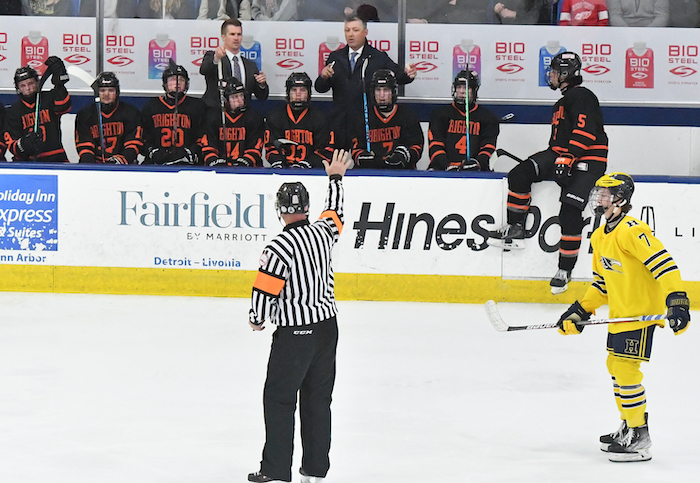 DiCristofaro is the assigner and referee-in-chief for the MHSAA’s Northeast Hockey Referees Association, and he has seen Smolinski’s growth first-hand.
DiCristofaro is the assigner and referee-in-chief for the MHSAA’s Northeast Hockey Referees Association, and he has seen Smolinski’s growth first-hand.
“Obviously he’s got great instincts and a feel for the game, along with a wealth of experience, all of which has allowed him to climb the ladder quickly,” said DiCristofaro. “It’s been a joy to watch his growth as an official.”
Fast forward to last Friday, and there were Smolinski and May sharing duties as referees during the MHSAA Semifinal with linesmen Michael Andrews and Thomas Robbins.
In between, there has been a learning curve that still continues, but the jump to officiating was not quite as daunting as his introduction to the NHL.
“I was scared to death. My first game was against Mario Lemieux. I’m in the old Boston Garden and now I’m playing against these guys and it’s their job, and they’re out there trying to make a living,” Smolinski recalled.
The emotions were not running nearly as frenzied for his first game as an MHSAA official, obviously, yet respect came in a different form.
“I couldn’t pick the puck up, I was breathing heavily; it was Kevin and me doing a two-man game in Brighton,” Smolinski recalled. “There were a few high-end kids playing, and I’m thinking, ‘I’m dying here.’ You know, there’s no training for that first time.”
What that experience did, however, was revitalize Smolinski in a new way. His playing career is well documented, not only in the NHL, but around Michigan. He enjoyed an honor-laden career at Michigan State University from 1989-93 before joining the Boston Bruins (who had drafted him three years earlier) at the end of the ’93 NHL campaign. Even after his final season, with Montreal in 2007-08, he stayed in the game via men’s leagues, or coaching his son, Max.
Smolinski and his wife, Julie, have three daughters: Ashtyn (22), Jojo (16) and Rylen (12), along with Max, whom dad coached for seven years including during a national championship run with a Little Caesars U15 team in 2019. Max, 19, is now playing collegiately at Rensselaer Polytechnic Institute.
So, for Smolinski, officiating offers a new chapter.
“Reffing brought back ... I wouldn’t say love of the game, because that’s always been there; it’s a different side of enjoying the game now. I have no horse in the race, my son’s off to college, my daughters are doing their thing; I wanted to find something new in the game,” Smolinski said. “I’ve coached, and I don’t want to do that. I found this, and I’ve stuck with it.”
Old College Ties
One of the great benefits of athletics at any level are the friendships made. For two kids who met in their first years on the MSU campus and forged a bond that lasts to this day, it’s amazing how their careers reached the pinnacle and have now come full circle.
Wes McCauley, an MSU teammate, is one of Smolinski’s best friends. After numerous years in the minor leagues, McCauley, like his friend, made it to the NHL. But McCauley made it as an official, working his first NHL game in 2003, when Smolinski was nearing the end of his playing career.
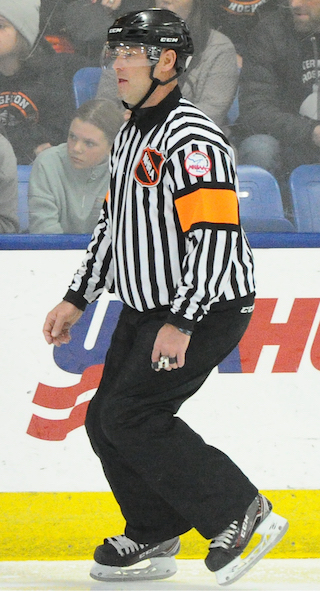 Their games lined up on just a few occasions in the NHL, and the two lobbied hard to have McCauley work Smolinski’s 1,000th career game in his final season with the Canadiens in 2007-08. The request, sadly, was denied by the league.
Their games lined up on just a few occasions in the NHL, and the two lobbied hard to have McCauley work Smolinski’s 1,000th career game in his final season with the Canadiens in 2007-08. The request, sadly, was denied by the league.
On the rare occasions when the friends did share the same ice, less than a handful by Smolinski’s count, it was McCauley who was forced to rebuff any attempts at fraternization. It’s just part of an official’s edict.
“For both of us, it was amazing; it was just great,” Smolinski said. “I’d say, ‘Hey man what’s up?’ and he says, ‘Can’t talk.’ I’m like, ‘What do you mean, we talk all the time.’ Again, he’s like, ‘Can’t talk, get away from me.’ You know, it was just business.”
McCauley then reached the 1,000-game plateau himself in 2018 and is still going strong as a regular selection for playoff duties with nine Stanley Cup Finals assignments, including last year.
So, it should have been natural for Smolinski to go to his old friend immediately for officiating pointers once he joined the ranks, right? Well, maybe not immediately.
“I talk to Wes all the time, but I actually hid it from him right out of the gate because I didn’t want to take his razzing. Eventually it got out, and he was loving it. He started sending me whistles and visors and pants,” Smolinski said, grinning. “And none of it fit, you know, because I’m older and fatter, and he’s so damn skinny. So, I still had to go out and get all new gear.”
Both Sides Now
Having been to the top of his profession, now moving to the other side of that same mountain that his friend McCauley scaled, the respect has grown for those blowing the whistle.
“The preparation for officiating is much more mental,” Smolinski said. “Way more rules oriented. You’re always trying to get away with things that you can as a player; now you have to police that.”
Smolinski has a distinct advantage.
“I know everything they’re trying to do because I’ve done it. I know where you’re going with the puck, I know what kind of breakout you’re trying to do,” Smolinski said. “I have all the instincts, now I just try to stay out of the way and not ruin their game. The most fun is watching the game develop and the ups and downs. For me to be out there and enjoy it with them, that’s the fun part.”
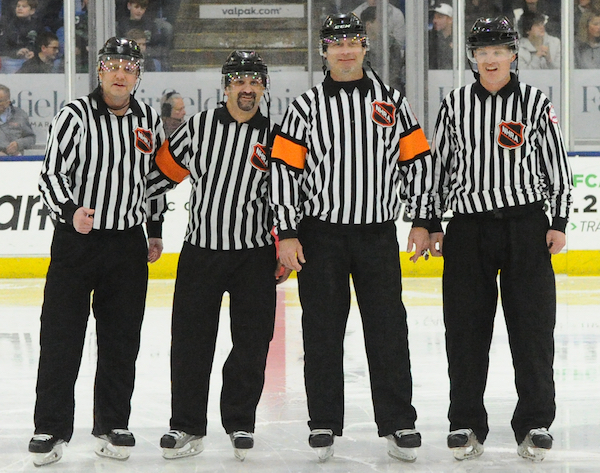 Those who have played hockey at any level have a built-in advantage should they consider the officiating avocation: the ability to skate. Unlike officiating in any other sport, skating is a prerequisite. This makes the pool limited, and almost solely composed of former players. Smolinski offers this advice.
Those who have played hockey at any level have a built-in advantage should they consider the officiating avocation: the ability to skate. Unlike officiating in any other sport, skating is a prerequisite. This makes the pool limited, and almost solely composed of former players. Smolinski offers this advice.
“I prefer sticking with high school because I think there’s more decorum, more administrative structure. Kids are playing for their schools, there’s loyalty there,” said Smolinski. “And there is more accountability. People need report to athletic directors and supervisors. Other levels can be more loosely governed, or a bit more maverick in nature. Moms and dads get involved more, coaches maybe know a little less,” said Smolinski.
He has, in fact, worked a handful of non-school games, and there’s a stark difference.
“I wanted to see what was going on, and I see it first-hand,” Smolinski said. “There are some crazy people and parents out there, and these guys are getting absolutely tortured. I’ve been tortured. There has to be a level of respect for what officials do. I think schools can rein that in a little more. All the guys I’ve met give up a lot of time and work hard because they love to do it and love the game.”
All sports need an assist from school administration and from those who once played the games to keep the officials recruitment moving in the right direction. People like Smolinski can help.
“He clearly doesn’t need to do this, and that’s what makes it so fantastic,” DiCristofaro said. “We need more people who have played – at any level – to do what he’s done and stay in the game as officials.”
Smolinski continues to promote the game in other ways as well. Currently, he is involved in the NHL’s Learn To Play initiative, which aims to inspire youth and welcome more families into the hockey community.
“We work hand-in-hand with the NHL Players Association for player development and industry growth,” Smolinski said. “Ages 5 to 9 are introduced to hockey, get head-to-toe gear and instruction, and meet some former players.”
The idea is to have fun first, which can translate into years and maybe even a lifetime in the sport. It’s a lifetime that has given Smolinski so much and continues to do so as he watches it unfold for others from his new vantage point.
PHOTOS (Top) MHSAA official Bryan Smolinski signals during Friday's Division 1 Semifinal between Brighton and Hartland. (2) Smolinski, a retired NHL standout, communicates with the Bulldogs' bench. (3) Smolinski keeps watch during game play. (4) Smolinski, third from left, with his crew: Michael Andrews, Kevin May and Thomas Robbins.

